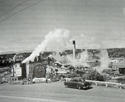Korea’s success, to date, in limiting the spread of the new coronavirus without extensive lockdowns has been widely acknowledged. A May 6, 2020 Atlantic article provides an excellent description of the “trace, test and treat” system employed here. The text messages used to trace new infections are even more detailed than described. read more »
Culture and Coronavirus: Pohang Journal
- Login to post comments
The Sad State of LA Transit
Once widely seen in the media as “the next great transit city”, the Los Angeles area’s rapid transit boom was turning to a bust — and well before the Covid19 crisis. As we can see below, transit ridership in greater Los Angeles, the nation’s densest urban region, has been declining for years, and things are not likely to get much better with the impact of the pandemic. read more »
- Login to post comments
The New Geography of America, Post-Coronavirus
When there is a general change in conditions, it is as if the entire creation had changed, and the whole world altered — Ibn Khaldun, 14th Century Arab historian read more »
- Login to post comments
The Coronavirus Means Millennials Are More Screwed Than Ever
In the nearly eight years since I first described millennials as “the screwed generation,” things have only worsened for those born between 1982 and 2000—and the coronavirus is now accelerating that slide. read more »
- Login to post comments
Domestic Migration to Dispersion Accelerates (Even before COVID)
In what could turn out to be a “dry run” for the post-COVID19 era, net domestic migration has strongly shifted away from the larger metropolitan areas, to smaller areas. This “sea-change” has occurred since 2015, according to the latest Census Bureau estimates. Domestic migration is reported by the Census Bureau when a resident or household moves from one US county to another (No migration below the county level is reported in Census Bureau population estimates). read more »
- Login to post comments
Towards a Better Urbanism
The pandemic has brought panic to the once-confident ranks of urbanists promoting city density. read more »
- Login to post comments
The Glory—and Risk—of Cities
The glory of cities is to serve as places of interaction between people and economies. Yet throughout history—from Roman times to the present—this advantage has also entailed exposure to deadly contagions. read more »
- Login to post comments
The Dangerous Consequences of Renewables in the Age of COVID-19
Michael Moore’s surprising anti-renewable’s and environmental-movement documentary “Planet of the Humans” unmasks the trillions being spent on wind turbines and solar panels that do not deliver as advertised. read more »
American Regionalism: Convergence on COVID-19
America’s many regions are once again in the news given the Coronavirus pandemic with various states forming groups – such as the Western States Pact of California, Oregon, and Washington or the eastern “COVID corridor” centered around New York – to manage and mitigate the response to read more »
- Login to post comments
Majority of COVID-19 Deaths in Nursing Homes: New Report
According to The Washington Post (May 6) “Expert say — and initial reports from European countries suggest — once the pandemic has subsides, roughly half of all deaths may be found read more »
- Login to post comments






















